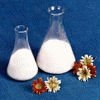- Organic Intermediate[10]
- Pharmaceutical[10]
- Amine[5]
- Organic Acid[1]
- Polymer[7]
- Chemical Auxiliary Agent[8]
- Feed Additives[1]
- Contact Person : Ms. Pan Cairu
- Company Name : Baoding Zhongbao Chemical Industry Trading Co., Ltd.
- Tel : 86-312-3024297 13930211892
- Fax : 86-312-3023286
- Address : Hebei,baoding,Sub.No.12chaoyang road
- Country/Region : China
- Zip : 071051
vinyl resin
Vinyl Resins countertype of VAGH,VAGD,VAGF,VROH,VMCH,VMCC,VMCA,VYHH,VYHD,VYNS-3 and so on for Coatings
Vinyl Resins are available in three general copolymer types:
Vinyl Chloride/Vinyl Acetate
Carboxyl-Modified Vinyl Chloride/Vinyl Acetate
Hydroxyl-Modified Vinyl Chloride/Vinyl Acetate
These copolymers are available as powders and solutions in a range of molecular weights and compositions. Coatings based on these resins are nonoxidizing and permanently flexible, and are characterized by the absence of color, odor, and taste. They are not attacked at normal temperatures by dilute alkalies or mineral acids, alcohols, greases, oils, or aliphatic hydrocarbons. They have a low moisture-vapor transmission rate, low order of water absorption, and are tough and durable.
The molecular weight and the ratio of vinyl chloride to vinyl acetate affect the solubility and other physical properties of the resin. As the molecular weight (degree of polymerization) is increased, the solution viscosity increases and the strength of the film increase. Vinyl chloride contributes film strength and toughness, as well as water and chemical resistance. Vinyl acetate improves solubility and film flexibility. When properly pigmented, coatings based on vinyl chloride/acetate copolymers have excellent outdoor durability. Hydroxyl-modification improves compatibility and adhesion, and provides a site for crosslinking. Carboxyl modification permits formulation of coatings that will adhere to clean metal surfaces on air- dry. Epoxy modification provides the ability to crosslink with carboxyl-modified vinyl resins to give an all-vinyl reactive system that yields thermoset-like characteristics, most notably improved toughness, enhanced physical properties, and superior chemical resistance.
Vinyl Resins, produced by a proprietary suspension polymerization process, offer several advantages:
High Purity
No water-soluble suspending agents or surfactants are used in the manufacture; therefore, water resistance is outstanding. Additionally, the as-received vinyl chloride monomer (VCM) content of dry vinyl powders is nondeductible.
Uniform Polymer Composition and Narrow Molecular Weight Distribution Provide predictable solution viscosities and batch-to-batch production uniformity.
Low in Gels
Easily dissolved and low in gels and insoluble materials.
Compatibility
Vinyl Resins are completely compatible with each other and many different types of resins.
Recoatable
Typically dry by evaporation. Hydroxyl-modified vinyls can be cured by crosslinking.
vinyl resin







